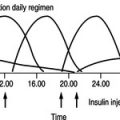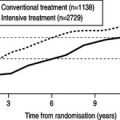CHAPTER 12. Improving care
Joan McDowell and Derek Gordon
Introduction 281
The right people 281
The right time 283
The right place 284
The right care 285
Conclusion 289
References 290
Useful website addresses 291
ORGANISATION OF CARE
People with diabetes require support to manage their own condition; this must be provided by the right people, at the right time, in the right place and with the right care. As health care in the UK is funded from public taxes, there is a public responsibility to ensure that money is used appropriately to ensure the most effective use of resources. Within the UK, the NHS facilitates equity in service provision, although its translation at national level might vary according to the unique health needs of the four nations.
The UK, and Scotland in particular, are taken as the template for this chapter. However, it is acknowledged that some of the principles outlined here are of relevance to healthcare settings in different countries across the world. It is also acknowledged that the funding for health care in different countries will drive the manner in which care is provided and hence there will be variations of practice due to economic factors (Bakker & Bilo 2004, Pedrosa 2004, Urbancic & Koselj 2004).
THE RIGHT PEOPLE
People with diabetes need access to a wide variety of people to support them in their diabetes care. In the first instance, general practitioners are the gate-keepers to specialist expertise. People who are not registered with GPs are therefore denied this point of contact.
The current delivery of care within the UK determines that most people with type 2 diabetes can receive satisfactory care within the primary care setting where structured support is offered (Griffin & Kinmonth 2005). GPs in the UK work as independent practitioners and hence hold a separate contract with the government for delivery of services. The General Medical Services Contract has introduced a new method of funding primary care practitioners with financial incentives offered to GPs who deliver diabetes care and meet national quality standards. These include annual screening for diabetes complications and percentage of people with diabetes whose cholesterol is below government targets (Kenny 2004). This is one example of government policy directly impacting on practice delivery. A Cochrane systematic review was undertaken on interventions to improve the management of diabetes in primary care, outpatient and community settings. This concluded that interventions that were targeted at healthcare professionals and organisational interventions increased the continuity of care. The effect on outcomes for people with diabetes was less clear (Renders et al 2005).
People with type 1 diabetes or those requiring specialist support around different parameters of their care, e.g. pregnancy, the use of an infusion pump or complications of diabetes, normally require specialist services in secondary care. People with complex needs, e.g. renal dialysis, also require specialist support. For the individual with diabetes, regardless of the care setting, a multidisciplinary team including doctors, nurses, podiatrists and dieticians is there to provide care.
At times, it is carers who require support. All members of the healthcare team are encouraged to involve carers in all their communications as they have a central role in supporting the person with diabetes. As diabetes affects an individual’s whole lifestyle, it is important that his or her family and friends are aware of what the person is going through, the support available and what they can contribute to the person’s care.
COMMUNICATION BETWEEN PEOPLE
It is essential that all professionals who are involved in the care of those with diabetes communicate effectively with individuals with diabetes, their carers and also with each other. The use of information technology has greatly facilitated this process. The development of primary care and hospital information technology systems with a common data set has resulted in the development of SCI-DC (Scottish Care Information Diabetes Collaboration, see: www.show.scot.nhs.uk/crag/topics/diabetes/diabit/Q&A.doc). This allows the flow of clinical information between different members of the team without the normal delay met through more routine channels.
PROFESSIONAL’S KNOWLEDGE
All members of the healthcare team need to be up to date in their knowledge base of diabetes to provide evidence-based care to individuals. Although post-registration education is developing as a norm within the UK (Scottish Executive 2002) it is not yet mandatory. The Scottish Executive Health Department has set up an advisory committee on diabetes education that addresses the education of professionals. In America, The Declaration of the Americas (DOTA) has set up an education task group which has established the norms for diabetes education programmes for people with diabetes in the Americas (www.paho.org). This addresses organisational issues, the educational programme for people and the professional characteristics required.
VOLUNTARY ORGANISATIONS
Voluntary organisations have a major role to play in supporting people with diabetes. The mission of the American Diabetes Association (ADA) is to ‘prevent and cure diabetes and to improve the lives of all people affected by diabetes’. Through their auspices, people with diabetes can be linked with peers or professionals as required. The ADA is a non-profit-making organisation that funds research and provides information and other services to people with diabetes, their families, professionals and the public. The association also advocates for the rights of people with diabetes. It is, therefore, very similar to Diabetes UK, which was discussed in Chapter 11.
The Scottish Executive aims to ensure that the NHS meets the needs and wishes of people receiving care and treatment and that services were designed for this purpose (www.scotland.gov.uk/library3/health/pfpi-00.asp). One consequence of this was that, under the auspices of The Scottish Diabetes Group, the Patient Focus Public Involvement Group was set up. The aim of this group is to ‘drive forward the implementation of the patient focus elements of the Scottish Diabetes Framework (Scottish Executive 2002) and to support the development of patient-centred diabetes services throughout NHS Scotland’ (www.diabetesinscotland.org/diabetes). Hence, within Scotland, there is a voluntary patient group that directly impacts on health service delivery for people with diabetes.
THE RIGHT TIME
People with diabetes need to access care when they determine that it is needed. This care can take the form of advice or an intervention. For this, the role of NHS 24 in Scotland, or NHS Direct in England, is crucial as an advice call centre. Diabetes UK also provides advice and a help line that can be accessed at its website (www.diabetes.org.uk). Most specialist diabetes centres offer telephone access to individuals. Both primary and secondary care normally offer drop-in clinics for individuals who want to use them.
Knowledge is power and to ensure that people with diabetes are empowered to take control of their lives, education plays an important part. Differing educational models are offered at different times within the person’s journey with diabetes. Professionals working in countries who do not necessarily have the same resources for educational programmes can still offer some form of information days for people with diabetes provided the multidisciplinary team work together to plan and shape the programme (Pender 2005).
Within the UK, Diabetes UK has taken a lead in several initiatives and their website is a ready source of material (www.diabetes.org.uk). The Welsh Assembly has supported a grant for Diabetes UK that has enabled them to compile a database of resources for people whose first language is not English. This database is to assist health professionals and covers 33 languages (www.diabetes.org.uk/health/patient/cymru.htm). Although this is not an exhaustive list, it is an excellent starting point when caring for people with different cultural backgrounds.
Information technology can also aid in the dissemination of information and can ensure that it is immediately available during consultations. SCI-DC is one example of a system that supports this for professionals. The internet has revolutionised global communications and access to information. People can access websites at a time that is most convenient to them to answer their questions or to link with others. There are thousands of websites that address aspects of diabetes care. Professionals and lay people are cautioned to access only those that are of a reputable organisation as the quality of websites is not always assured.
The web has added benefits for people with diabetes and professionals as they can all access current research through e-journals. The NHS Education for Scotland e-library (www.elib.scot.nhs.uk) aims to manage a knowledge-base to support people with diabetes. This is considered essential to ensure high-quality person-centred care. Within the e-library there is a diabetes portal that, as well as managing the many databases of books and journals, allows for ongoing discussion around topical issues in diabetes care from people with diabetes, carers, Diabetes UK and professionals. People need an Athens login address before entering the e-library. Relevant web addresses have been interspersed throughout chapters in this book, although these are not exhaustive. Two readily accessible search engines for locating professional material on the web are PubMed and Google Scholar.
THE RIGHT PLACE
To support people with diabetes, advice and interventions need to be accessible to individuals. People with type 2 diabetes are more frequently offered such services within primary care, which is usually nearer to them geographically. Those with type 1 diabetes are usually offered care within their local specialist care setting. It is acknowledged, however, that within the UK, boat, train or plane journeys might be required to access specialist care facilities.
There are particular challenges to delivering care to people who are not in a position to autonomously access care. People who live in an institutionalised setting are not usually mobile enough to attend any care settings. Those residing in nursing homes or in long-term care are dependent on others to meet their health needs, which can be complex (Benbow et al 1997). People who are housebound might not have access to some services. Community nurses in particular are uniquely placed to provide support for those who are unable to access care within a GP’s practice (Forbes et al 2002, Harris 2005).
Prisoners with diabetes also have difficulty in accessing the same level of service as those living in the community (Meakin 2004). Given that the Department of Health in the UK aims to provide prisoners with the same level of care as those outside the prison, it would appear that there is still a lot of work to be done in this area (Balance 2005).
People who have other complex problems might also be reliant on others taking the lead role to ensure they receive the appropriate care. Those who have learning difficulties, other disease entities, or an addiction to alcohol or drugs might all experience problems in accessing care due to situations beyond their control.
We live in times of globalisation and most Westernised cities are multicultural in population groups. It is therefore essential that care is offered in a culturally sensitive way and in a culturally appropriate place. It might be necessary to hold clinics in a mosque or social club to meet the needs of particular population groups.
Stay updated, free articles. Join our Telegram channel

Full access? Get Clinical Tree







